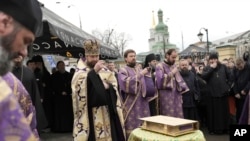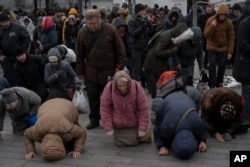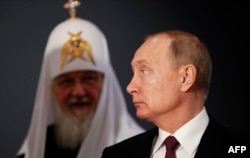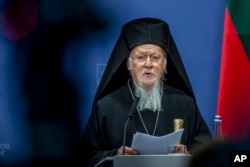Last week, the Ukrainian government ordered monks from the Ukrainian Orthodox Church (not to be confused with the independent Orthodox Church of Ukraine) to vacate the historic Kyiv-Pechersk Lavra monastery. The Church refused and held a service there on Sunday, April 2.
The Ukrainian Orthodox Church is part of the Russian Orthodox Church but claims to operate with autonomy. Still, many in Ukraine believe the church remains under the sway of the Moscow Patriarchate.
Protesters demanding that the Ukrainian Orthodox Church be evicted descended on the monastery.
Sergey Naryshkin, director of Russia’s Foreign Intelligence Service, attempted to portray the drama as a Western war on the Orthodox faith:
“The current regime in Kyiv and its masters in the capitals of Western nations seek not only to ban, but to physically destroy canonical Orthodoxy in the territory of Ukraine.”
He added that the West essentially does not recognize red lines “when it comes to fueling religious conflicts.”
Claims that the West is attempting to destroy the Orthodox Church in Ukraine are false.
While there are genuine concerns about encroachments on religious freedom, what’s happening with the Orthodox Church in Ukraine, broadly speaking, reflects Ukraine’s desire for national self-determination in the face of Russian aggression. There is no war on the Orthodox faith. The issue is the institutional link between the Ukrainian Orthodox Church and Russia, the aggressor state, during a time of war.
First, some background.
Orthodox Christianity is the largest religion in Ukraine, although there is a sizable Greek Catholic minority, along with smaller Jewish and Muslim communities.
As mentioned above, there are two orthodox churches in Ukraine: The Ukrainian Orthodox Church, under the Moscow Patriarchy, and the Orthodox Church of Ukraine, which is independent from the Russian Orthodox Church.
In May 2022, the Ukrainian Orthodox Church declared its independence from the Russian Orthodox Church.
However, the Synod of the Ecumenical Patriarchate of Constantinople did not grant the Ukrainian Orthodox Church “autocephaly” – a term roughly meaning autonomy.
The Ecumenical Patriarch of Constantinople, Bartholomew, is the primary spiritual leader of the Orthodox Christian world.
Bartholomew did grant the other Ukrainian church, the Orthodox Church of Ukraine, autocephaly in 2019.
That move angered Moscow, which, along with the Russian Orthodox Church, attempted to blame the United States for fostering the church schism.
There is no evidence to support that claim, and Bartholomew denied his decision to grant the Orthodox Church of Ukraine autocephaly was influenced by outside forces.
Robert Blitt, a professor of law at the University of Tennessee, said the catalyst for Orthodox Church of Ukraine autocephaly was the Russian Orthodox Church’s “unflinching alignment” to the political goals of Moscow, not U.S. interference.
Blitt argued:
“[A]gainst the backdrop of Russia’s annexation of Crimea and support for separatist groups in Ukraine’s Donbas region, the Moscow Patriarchate overplayed its hand. Among other things, Church officials appeared to deny the authenticity and legitimacy of Ukrainian national identity, manifested support for rebels operating in Donetsk and Luhansk, and blessed Russian military equipment deployed to Crimea.”
Attempting to justify Russia’s 2022 invasion, Putin claimed the Orthodox faith faced persecution in Ukraine.
The head of the Russian Orthodox Church, Patriarch Kirill of Moscow, expressed full-throated support for Russia’s war effort.
In February, European news media, citing declassified Swiss police documents, reported that Kirill served as a KGB spy in Switzerland in the 1970s.
“Kirill, who today is a fervent supporter of Putin's war in Ukraine, lived in Geneva in the early 1970s, officially as a representative of the Russian Orthodox Church at the World Council of Churches (WCC). Under the code name ‘Mikhailov,’ Kirill's mission was to influence the council, already infiltrated by the KGB,” France 24 reported.
The Ukrainian Orthodox Church’s decision to declare independence last year was spurred by Moscow's invasion, which it condemned.
Reacting to public anger, Ukrainian Orthodox Church priests stopped mentioning Kirill in public prayers.
More than 400 priests also signed an open letter condemning Kirill for “supporting the aggressive actions of Russian troops on the territory of Ukraine.”
Last month, Bartholomew said the Russian Orthodox Church cooperated with the Russian state “in the crime of aggression” against Ukraine and “shared the responsibility for the resulting crimes”
Still, Ukrainian Orthodox Church priests are dogged by allegations that they remain loyal to Moscow.
That has prompted a reaction by the Ukrainian government which, some fear, may result in religious freedoms being curbed.
Ukrainian President Volodymyr Zelenskyy had mulled a law that would have made “it impossible for religious organizations affiliated with centers of influence in the Russian Federation to operate in Ukraine.”
Zelenskyy signed a decree imposing personal sanctions against representatives of religious organizations associated with Russia.
Ukrainian Orthodox Church monasteries, churches and other related sites have faced raids across the country.
Dozens of Ukrainian Orthodox Church priests have faced investigation or criminal proceedings for allegedly collaborating with Russian forces or supporting Moscow’s war effort.
Some Ukrainian Orthodox Church clergy have been convicted for collaborating with Russian forces. Others have reportedly fled to Russia.
The Security Service of Ukraine (SBU) accused the former abbot of the Kyiv-Pechersk Lavra monastery, Metropolitan Pavlo, of “inciting religious enmity, justifying and denying the armed aggression of the Russian Federation against Ukraine.”
On April 1, a court placed Pavlo under house arrest. Pavlo denied the charges against him.
The Washington-based Institute for the Study of War said Moscow’s response to events at Kyiv-Pechersk Lavra exemplifies its “continued weaponization of religion in order to frame Ukraine as evil and position Russia as the protector of Orthodox Christian values.”
Still, a top United Nations Human rights watchdog warned that the Ukrainian government risks undermining the right to freedom of religion or belief, noting that “any limitations to the right to manifest one’s religion or belief must be prescribed by law, necessary and proportionate.”
But the watchdog said Russian-occupied regions of Ukraine had also faced “restrictions to freedom of religion.” It added that decades-long tensions between the Orthodox communities in Ukraine had deteriorated “following the Russian Federation’s armed attack against Ukraine.”
The administration of U.S. President Joe Biden has expressed support for Ukraine’s right to self-defense, while also saying he expects Ukraine to protect freedom of religion, as outlined in international law.



